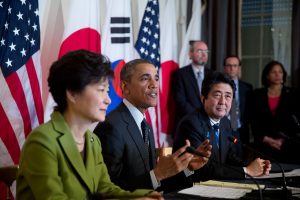South Korea’s current ambassador to Japan, Lee Byeong-gi, has been tapped to take over the directorship of the National Intelligence Services in the ongoing cabinet reshuffle. Whoever takes over as Seoul’s envoy in Tokyo after Ambassador Lee’s confirmation will assume the difficult job of acting as the diplomatic bridge between two countries with a perpetually fraught relationship.
The new ambassador will immediately face four key issues upon his or her arrival in Tokyo:
First, Japan recently eased its sanctions against North Korea in return for Pyongyang agreeing to investigate the fate of Japanese citizens abducted during the Cold War. The Abe government’s chief cabinet secretary, Yoshihide Suga, emphasized that Tokyo will only ease the sanctions Japan imposed on its own, and not the ones imposed by the UN. Still, Seoul expressed annoyance at Tokyo’s unilateral decision. In particular, the fact that the agreement between Tokyo and Pyongyang was made at a time when President Park Geun-hye was insisting on the need to restrain North Korea’s nuclear ambitions, referring to another nuclear test as a “Rubicon,” enhanced the perception that Tokyo undermined Seoul’s ability to pressure Pyongyang on denuclearization.
Second, Prime Minister Abe is seeking a reinterpretation of Article 9 of Japan’s constitution to allow Tokyo to participate in collective self-defense. This revision most immediately affects Tokyo’s policy towards the Korean Peninsula. While there is increasing pressure from Washington for South Korea and Japan to cooperate more closely on regional security matters, the current public sentiment in South Korea makes any government support for Japan’s new doctrine politically risky. Furthermore, given Korea’s colonial history, even the vague possibility of Japanese forces entering Korean territory is unacceptable to both the government and the people. As a result, South Korea has moved to nullify Japan’s ability to exercise “active pacifism” on the Korean Peninsula by highlighting the fact that North Korean territory is constitutionally defined as a part of the Republic of Korea and that Seoul will not tolerate Japan taking unilateral actions in South Korea’s sovereign territory.
Third, the timeless territorial dispute over the Dokto islets, which in recent years had been overshadowed by the conflict between China and Japan, was reignited when Tokyo called on Seoul to avoid conducting naval drills near the contested islands. While seemingly minor, the fact that Tokyo raised the issue at a time when relations between the two countries are already strained makes the dispute more toxic.
Finally, the Japanese legislature recently agreed to hear the results of a review of then-Chief Cabinet Secretary Yohei Kono’s 1993 statement acknowledging the role of the Japanese Imperial Army in recruiting sex slaves (“comfort women”) during the Second World War. Known more commonly in South Korea as the “Kono Statement,” this caught Seoul by surprise as Prime Minister Shinzo Abe had said as recently as March of this year that he saw no reason to revise the document. Both the South Korean government and the South Korean media condemned the revision as a sign that Japan is uninterested in improving relations with Seoul.
All these issues render cooperation between the two governments nearly impossible in the near future. This is especially true now that the Park administration has already spent political capital on getting its controversial prime minister nominee confirmed, and will be wary of inciting massive public opposition (as the previous Lee Myung-bak administration did in 2012) over establishing a more cooperative relationship with Tokyo. This suggests any hope that South Korea and Japan could restart negotiations over an intelligence sharing agreement has likely been dashed for the remainder of Park Geun-hye’s presidential term.
All in all, the ambassadorial post in Tokyo is an unenviable one.
































